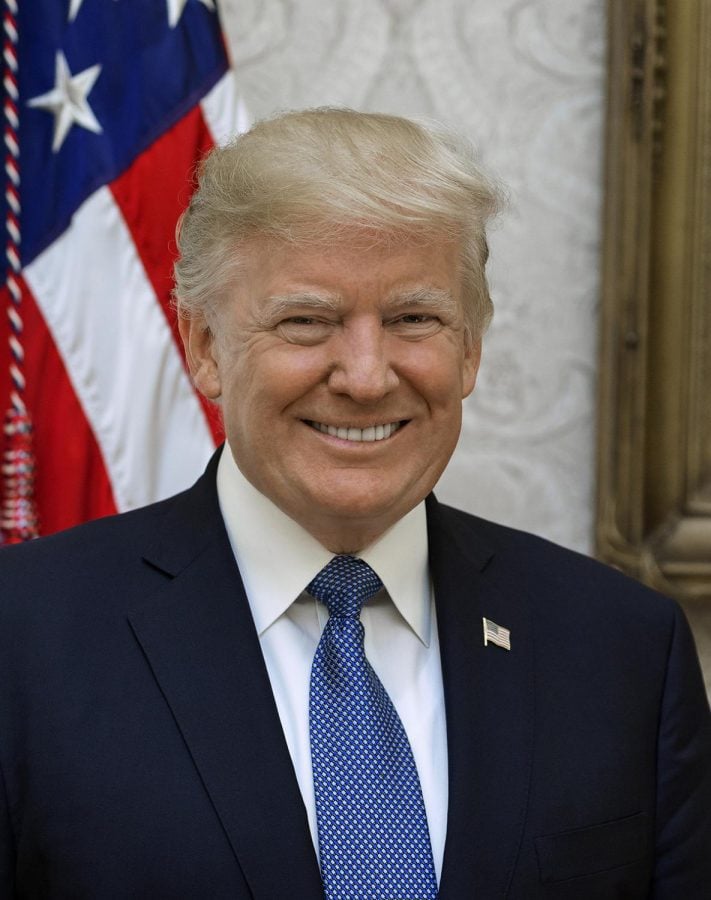Trump declares opioids a national health emergency
President Donald Trump poses for his official portrait at The White House, in Washington, D.C., on Friday, October 6, 2017. By Shealah Craighead – https://www.whitehouse.gov/the-press-office/2017/10/31/white-house-releases-official-portraits-president-donald-j-trump-and, Public Domain, https://commons.wikimedia.org/w/index.php?curid=63768460
On Oct. 26, President Donald Trump declared the opioid epidemic a national public health emergency.
“We are currently dealing with the worst drug crisis in American history,” said Trump, according to the NPR. “It’s just been so long in the making. Addressing it will require all of our effort.”
The crisis involves a rapid increase in the use of opioid drugs, which include vicodin, morphine and heroin, due to their potency and availability in America.
Locally, actions have already been placed to combat this problem, such as the STOP Act and the NC Opioid Action Plan, both enacted by Governor Roy Cooper last spring. They were instilled in an attempt to reduce opioid abuses throughout North Carolina. Following this public health emergency declaration, these initiatives will also be supported by larger organizations.
The crisis has also registered feedback across the Guilford community.
“It’s definitely not a time to stay divided and opposed against one another,” said sophomore Sean Kinloch. “If we as a nation are willing to rid of the opioid crisis, we should not waste time over fighting, although helpful discussion on planning should occur.”
The opioid epidemic has been a major issue since the late 1990s and has continued into the first two decades of the 2000s. According to the U.S. Drug Enforcement Administration, overdose deaths have reached very high levels in recent years and have become the leading cause of death of Americans under 50.
According to CNN, the opioid crisis claimed more than 64,000 American lives in 2016. Trump’s 2016 presidential campaign ran on a national fight against drug addiction and abuse across the country, a platform that swayed many votes from communities most affected by the opioid crisis to Trump’s victory.
Sources said to CNN that Trump originally planned on declaring the opioid epidemic a national emergency in August. Trump believed that declaring the crisis a public health emergency would be more appropriate than a national emergency.
This declaration has been met with some resistance among members of Congress and within the Trump administration. This disagreement stems from the declaration’s lack of clarity regarding is unclear on which organization. and under which set of specific political guidelines, will lead the opioid emergency campaign.
The biggest question surrounding Trump’s plan to combat the opioid epidemic involves money. Many politicians have deemed that funding an initiative to stop an opioid crisis that seems unlikely to recede anytime soon as a risky measure. With funding used to support current addiction treatment programs set to expire next year, Congress and the White House will need to work together to organize funding for the efforts.
Many people believe that declaring the opioid epidemic a public health emergency is not enough. Funding is a major requirement for combatting this problem, and declaring a public health emergency will not yield major funds. Instead, critics of Trump’s declaration want a national emergency to be declared, so that more funds can be allocated to solving this issue.
It is unclear whether the Department of Health and Human Services will use its authority under the public health declaration to negotiate lower prices for drugs that combat the effects of opioid overdoses. Some lawmakers and public health organizations argue that such a measure is crucial, but requires time and effort to develop and place into full effect.
By declaring this opioid epidemic a public health emergency, many resources will be freed up to help states and local agencies, according to North Carolina Health News. Similar to government agencies helping areas that declare a state of emergency after a natural disaster, other drug-related agencies can help areas regulate drugs.
However, in spite of an uncertain start to the campaign, others remain hopeful.
“I’m glad Trump has called for action against the opioid crisis,” said Guilford College first-year Sean Kinloch. “With the opioid crisis gone, I think the morale and health of the nation will greatly improve.”
Much of the Guilford community hopes for wise and speedy regulations concerning the epidemic.
“First of all, I want to see the amount of opiates available as over-the-counter medications reduced drastically,” said Early College junior DJ Moore. “A lot of people get hooked when they’re prescribed to pain medications. With that in mind, I also want more research funding dedicated to replacements for current opiates that are not addictive.”









